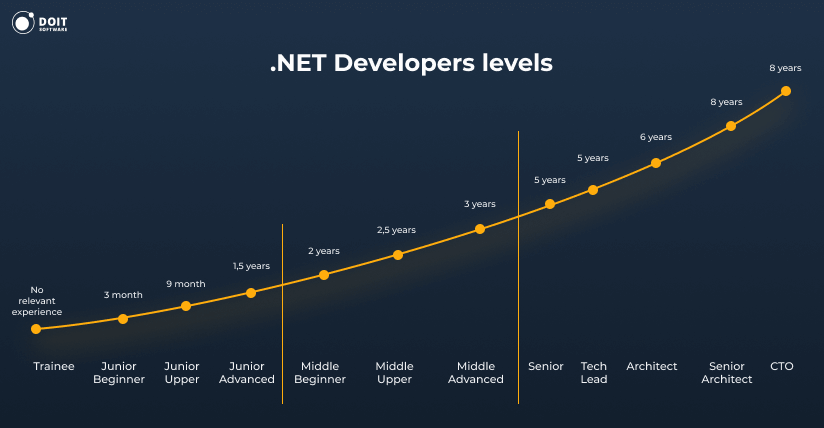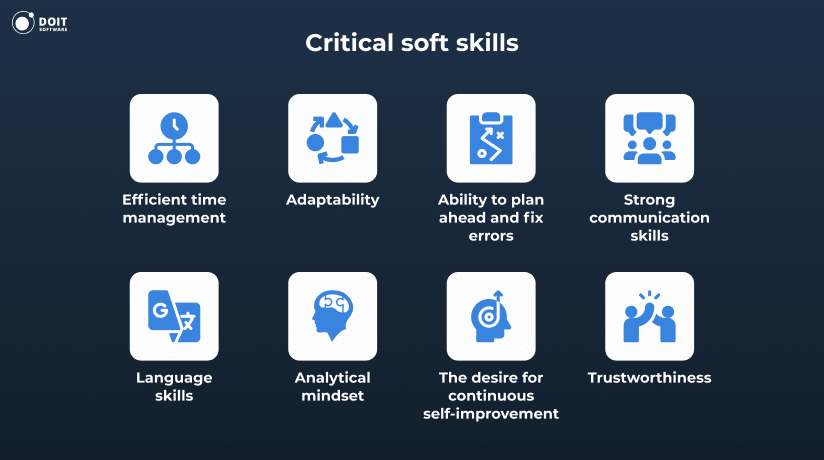Recruiting .NET developers can be draining. It’s probably one of the most significantly stressful activities hiring managers endure throughout their careers. Despite the fact that .NET is widely used by 27% of developers, companies are dealing with an ever-growing talent shortage. Furthermore, evaluating the qualities of exceptional .NET candidates can be extremely difficult.
For instance, even when presented with a perfect resume, how do you assess the candidate’s ability to receive constructive feedback? What about their level of expertise in ASP.NET Core, Entity Framework, Blazor, or Angular?
Despite all the challenges you may have faced before, the good news is that you can leverage proven best practices to hire .NET developers without remorse. In this article, you’ll learn how to find qualified professionals, how to hire the best crop, and how to dodge common pitfalls. So, let’s get started!
First, we need to get to the root cause of the .NET talent shortage. Many theories are flying around regarding why finding the right .Net or ASP.NET Core coder is a hassle. We noted several contributing factors based on our expertise in staffing .NET developers. Here’s a look at the most prevalent:
What exactly is a .NET developer? Who are they, and what do they do? Several people doing the hiring aren’t sure either. Startling right!
The term .NET refers to the modern cross-platform framework developed by Microsoft, initially introduced as .NET Core in 2016 and later unified as .NET.
It’s clear that .NET and ASP.NET Core technology hold much potential for IT. The framework accelerates the development of web, desktop, and mobile software, providing a secure way to build digital products. Even popular platforms online like Microsoft, GoDaddy, and StackOverflow currently use this framework.
The ideal .NET developer to hire would be familiar with .NET 8/9+, ASP.NET Core, Blazor, .NET MAUI, and other modern .NET stacks.
When you hire .NET developers, you are getting web programmers with extensive experience in .NET development, thus improving productivity. They specialize in building robust software, applications, and interfaces.
To determine the level of skill a .NET developer must hold to complete your team, elaborate on what tasks are to be completed throughout the project. You might end up realizing that more developers than you first thought do indeed meet your requirements. The job description is critical for this.

Given the vast amount of skills relevant to .NET technology, it’s nearly impossible for one person to know all there is to it. Each role has different requirements. The following table can serve as a baseline on how to hire developers in 2025:
Trainee
No relevant experience
C#, basic understanding of OOP principles, introduction to .NET basics
Junior Beginner
3 months
C#, ASP.NET Core fundamentals, HTML, CSS, basic understanding of REST APIs
Junior Upper
9 months
All the skills above + Entity Framework Core, SQL basics, JavaScript/TypeScript, and basic knowledge of React, Angular, or Vue.js
Junior Advanced
1.5 years
All the skills mentioned above + advanced understanding of ASP.NET Core, Blazor basics, and API development following best practices
Middle Beginner
2 years
All the aforementioned skills + solid SQL Server knowledge, state management (e.g., Redux, Context API), and familiarity with GitHub Actions
Middle Upper
2.5 years
All the skills listed above + strong experience in front-end frameworks (React, Angular, or Vue), proficiency with JSON-based APIs, and performance optimization in SQL queries
Middle Advanced
3 years
All skills listed above + expertise in microservices architecture, gRPC, advanced debugging, and familiarity with Dapper for ORM
Senior
5 years
Confident in C#, ASP.NET Core, strong debugging skills, experience with Azure or AWS cloud services, and scalable system design expertise
Tech Lead
5 years
Proficiency in leading teams, developing enterprise solutions with ASP.NET Core, advanced MSSQL knowledge, unit testing with xUnit/NUnit, and Agile/Scrum methodology experience
Architect
6 years
Expertise in architecting complex web applications using .NET, expertise in the following: creating ASP.NET Core applications, experience in creating data access components with Entity Framework, building web APIs
Senior Architect
8 years
3+ years experience of senior programming, expert level skill in .NET technology stack, building large enterprise solutions, front-end frameworks, debugging, Jira or similar tools, metric collection tools, tech writing skills
CTO
8 years
Expert in tech trends, budgeting and planning, leadership abilities, profound knowledge of .NET and ASP.NET Core programming
Additionally, one cannot ignore that graduate developers are often overlooked. While most educational programs do not provide ample concentration on .NET development, leaving school without such educational qualifications doesn’t necessarily mean fresh graduates do not have experience at all. Most savvy students go the extra mile to work on external projects that provide the needed .NET development experience. For instance, internships and private courses.
As you may have noticed by now, finding the right .NET professional could be easily solved by a clear job description. Being open as to what qualifies as experience for a .NET developer will also make a difference.
How is your hiring process structured? Can you effectively identify competent developers before moving on to onboarding them? Answering these critical questions can save you both time and money. Be aware of possible cracks in your hiring processes.
If your access is limited to a small pool of developers who meet your criteria, it will severely affect the success of your talent search. You may end up having to hire someone who is not up to the task simply because there are no better-qualified candidates. Additionally, you may have to pay high compensation for your next .NET developer due to scarcity and high demand for programmers.
Consider engaging an IT partner to extend your pool of .NET developers. Outstaffing services will help you fill the vacancies on your team with the right people. With a partner like DOIT Software, you won’t just be looking at an increase in quantity. It’s an increase in quality as well, as we connect you to reputable and experienced professionals.
The hiring process must be short and precise, leaving little margin for error. According to statistics, the average hire time for a .NET developer is 14 days. The faster you are able to hire .NET talent, the easier it will be to complete your project and meet your set deadlines.
Employing the help of an IT staffing partner will enable you to speed up the hiring process, thanks to a readily available database of vetted candidates and assistance with interviewing and, in our case, onboarding as well.
Another difficult area is how to evaluate .NET developer skills. Refining and optimizing your hiring processes to adapt to the industry standards will plug this crack in the system. Your approach to the candidate evaluation process must incorporate a technical interview, soft skill analysis, and hands-on test tasks.
Make sure the individuals providing the technical interview know what skills are required of the candidate. Define the job and the skills needed in preparation for the interview. It will go a long way in ensuring you hire a .NET developer that’s capable of doing the job to your satisfaction.
It’s critical to identify suitable candidates as quickly as possible. A few workarounds that can speed things up include:
The last option sets you up for interviews almost immediately with top-notch professionals who have the right skills. It also outsources the bulk of the recruitment stages to the staff augmentation service provider, thus, saving you time and money.
Now that we have already covered what .NET developers are, let’s get into the technicalities of finding your perfect fit.
If you recall earlier, we divulged in detail the programming skills necessary to fill in different .NET developer posts. Note that the indicated skills do not necessarily make the essential list. The technical abilities to consider when you hire .NET developers are as follows:
Candidates with comprehension of:
Candidates can also provide portfolios which you can go through. Some have projects uploaded on public repositories like StackOverflow. This will also be helpful in assessing technical abilities.
To avoid hiring someone not up to the task, ask about their experience. Proceed to check their knowledge and verify it in practice where possible.
Reviewing CVs involves weighing educational qualifications as well. Apart from degrees and diplomas, there are also .NET certificates for programming skills.
Certain experts believe .NET certificates are an adequate measure of skill. But not everyone holds this view. To other recruiters, when you hire a .NET developer, professional exams don’t add much weight. They do not show practical experience.
Developers without experience often undergo these exams to increase their appeal. When looking for a .NET developer, keep in mind that there are capable .NET developers who will not have certificates. They may be unwilling to sit for the exam as they already have ample experience.
To sum it up, commercial experience is the most appropriate measure of skills. A certificate shouldn’t be the ultimate qualification.
For example, popular .NET certificates like Microsoft Certified Technology Specialist (MCTS) and Microsoft Certified Solutions Developer (MCSD) are now considered legacy. Microsoft retired these programs to modernize and align certifications with the latest technologies. But you can still keep an eye on some valuable Microsoft Applied Skills and Certifications related to .NET technology when choosing.
Soft skills will determine how well a developer works as a team member. A robust set of soft skills will include:

The above are critical when drafting the job description. Nonetheless, use this list only as a guide. Disregarding candidates who don’t qualify for all of the requirements isn’t a smart approach.
Apart from resumes and programming tests, interviews also contribute to informed hiring decisions. Recruiters use face-to-face interviews to determine the character and fit of the candidate.
Besides, the recruiters must be aware of which technologies will apply during development. Placing a senior developer on the interview panel helps as they will ask the right questions. They can help determine how well the candidate will fit into the team.
If meeting in person is not possible, an interview via a video call may also suffice. There’s more to be learned by putting a face to the name. Non-verbal cues can reveal a lot about the candidate’s personality that a resume won’t.
Your interview should center around the following areas:
Interview questions must establish whether the candidate fits with the existing team. Things like technical terms are useful indicators of the candidate’s knowledge.
When hiring a senior developer, ask computer science and role-specific questions.

You can’t effectively measure one’s skill level using the resume alone. This is where tests come in handy.
Put together a programming test to check technical proficiency. You can rely on online resources for this. Use the C# and .NET programming tests available to pre-screen candidates.
Another interesting approach is to use a test based on a use case from your company. This will be much closer to the conditions they will face on the job.
Aside from programming skills, such tests help hiring managers verify a candidate’s efficiency. For instance, determining if they won’t waste time during development. Here at DOIT Software, we evaluate all candidates with test tasks to confirm technical proficiency.
Below is a glossary table to enable you to understand the skills listed by candidates. It explains what testing for each of these core elements covers.
.NET versions
.NET 8, .NET 9 (latest LTS)
Languages
C#, F#, Visual Basic .NET
Web frameworks
ASP.NET Core, Blazor, ASP.NET Web API
Desktop frameworks
.NET MAUI, WPF, WinUI
Communication frameworks
gRPC, SignalR, ASP.NET Core Web API
IoC Containers
Autofac, Microsoft.Extensions.DependencyInjection, Ninject
ORM
Entity Framework Core, Dapper
Unit testing frameworks
xUnit, NUnit, MSTest
Build and CI/CD tools
Azure DevOps, GitHub Actions, Jenkins, TeamCity
This enables you to understand which frameworks and programming languages they use. It also provides an overview of their work history. Commercial experience ensures the candidate can adjust to tight deadlines, etc.
A good .Net or ASP.NET Core programmer can only be defined by previous experience. This will shed light on what areas the candidates are experts in. Find out how they gained their .NET experience. Be it by starting or contributing to a free software project.
Today’s robust software is a result of the latest technology. A developer should continuously learn new languages. Driven .net programmers will be well-informed about the technology aspects of the project.
A clear understanding of your enterprise shows how invested a candidate is in the job offer. If they can imagine joining your team, they can already determine the problem you want to solve. And best of all, visualize the solution!

Now that you know how to hire a .NET developer, where do you start your search? Let’s find out.
In-house hiring
You can grow your developer team by hiring in-house employees. Your HR department advertises vacancies to attract seasoned professionals on job boards, job sites, and other developer communities. From there, the top candidates are vetted and interviewed to find the most suitable individuals to hire.
In-house hiring will, however, require you to spend more time and money on recruitment processes as there are usually no readily available candidates.
Hiring freelance .NET developers
Aside from taking on .NET developers as full-time employees, you can also hire them as freelance developers. To hire freelance .NET developers, companies have to first scout for suitable collaborators, trace references to verify the freelancer’s work history, and conduct interviews.
Although freelancers are hired on a temporary basis, the recruitment process requires as much time and effort as hiring in-house .NET developers. Hiring managers often face challenges when it comes to verifying a potential candidate’s technical skill level. Skills evaluation will require companies to carry out technical interviews and conduct test tasks all by themselves.
Make use of job sites
For small projects, you can hire a freelance ASP.NET Core developer. Another option is finding .NET developers on platforms like Upwork and Freelancer. It is a low-cost approach and also helps you get the work done quickly. You will, however, need to carefully go through the reviews to ensure the developer you hire is truly up to the task.
Explore online dev communities
Another good place where you can hire .NET developers are online communities. Many .NET coders with ample experience frequent such places. You can post your open positions on job boards for dev communities on sites like Stack Overflow and GitHub.
Staff augmentation services
An augmented staffing company immediately puts you in touch with qualified professionals. It is a cost-saving solution for filling up the talent gap with temporary or remote hire .NET developers. You get to expand your existing development team to fulfill the requirements of your project.
As an IT partner, DOIT Software can help you fill up .NET developer roles with the talent you need.
Staff augmentation
Pre-vetted candidates
New team members integration
Large pool of qualified professionals
Fast and efficient hiring processes
Job sites
Large audience
Little to no assistance for candidate vetting and interviews
Competitive employee ranking and reviews
Time-consuming
Access to qualified developers
Dev community job boards
Direct access to .NET developers
No assistance for candidate vetting and interviews
Little to no job listing costs
High recruitment costs
To hire .NET developers (the top 5% of coders) without overspending, you may need to opt for nearshoring or offshoring. According to Glassdoor, the average yearly cost of hiring .NET developers in the USA without factoring in related administration expenses and taxes is $126,542. It is regarded as one of the regions with high salaries for such professionals.
Read through these average costs based on research provided by UpScale, Glassdoor, StackOverflow, and PayScale. Note that these figures only account for the salaries developers receive. To find the full cost to the business, add about 30% to the given salary figures as an estimate for administration expenses and related taxes. Here are the salaries you can expect to pay .NET developers:
USA
$104,500
$126,000
$155,000
UK
$45,500
$71,000
$86,000
Sweden
$51,400
$60,000
$89,000
Norway
$65,000
$73,000
$87,500
Denmark
$71,500
$73,500
$86,000
Finland
$45,500
$54,000
$60,500
Netherlands
$52,000
$65,000
$71,000
Australia
$111,000
$135,500
$189,000
Switzerland
$92,500
$114,000
$138,500
Spain
$45,000
$68,500
$82,000
Portugal
$42,000
$61,500
$80,500
Eastern Europe
$36,000
$46,000
$54,800
Source: Average salary per year for .NET developers per country/region based on unique online job postings on Glassdoor, Payscale, and the 2024 StackOverflow survey.
It can be quite easy to hire .NET developers without breaking a sweat. Position your company to tap into the vast talent pool accessible through the various approaches mentioned above. Whether the most beneficial arrangement is through freelance platforms, online developer communities, or, better yet, IT partners like DOIT, the hiring process can be largely simplified.
Refine your internal recruitment functions by leveraging face-to-face interviews, test tasks and take a modern stance towards evaluating .Net developer qualifications. You could never go wrong building your team this way. If you don’t want to go through the dreaded hunt for the right .NET developer, finding the right staffing partner who knows the ins and outs of the industry, like DOIT Software, is your best shot. Get in touch!
A .NET programmer can help you develop dynamic, feature-rich websites. Using AASP.NET Core’s built-in middleware and advanced performance optimization features, a specialist ensures high performance and speed. Moreover, robust security protocols, including built-in OAuth 2.0, OpenID Connect, and cloud-based security integrations, help safeguard your apps.
Also, a .NET developer can use frameworks like Blazor and ASP.NET Core MVC to create efficient, high-performance applications. By investing in a dedicated expert, you benefit from their focused expertise to deliver tailored solutions that can grow with your business needs.
The cost to hire .NET programmers varies by region and experience. In the USA, you might spend approximately $104,500 for a junior, $126,000 for a middle, and$155,000 for a senior developer. However, the cost is significantly lower in Eastern Europe, at about $36,000, $46,000, and $54,800, respectively. Thus, it is an economically viable option for sourcing expert .NET development talent globally.
According to Statista, ASP.NET and ASP.NET Core were in the top 10 most used web frameworks by developers worldwide in 2024. This trend reflects the continued need for hiring NET developers who can leverage these technologies to build robust, scalable web applications.
Many prominent companies use .NET developing their solutions. For instance, Wexflow utilizes .NET to power its extensible workflow engine. Thus, it enhances automation and user interaction for better customer experiences. Furthermore, Stack Overflow, a cornerstone of the developer community, famously uses .NET to drive its applications. Other companies that have used this technology are Chipotle, a leader in the fast-casual dining sector, and Vestas, the energy industry giant.










